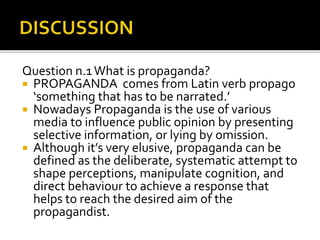
Discussion
- 1. Question n.1What is propaganda? PROPAGANDA comes from Latin verb propago ‘something that has to be narrated.’ Nowadays Propaganda is the use of various media to influence public opinion by presenting selective information, or lying by omission. Although it’s very elusive, propaganda can be defined as the deliberate, systematic attempt to shape perceptions, manipulate cognition, and direct behaviour to achieve a response that helps to reach the desired aim of the propagandist.
- 2. Question n.2When did it start to be used? It can be traced back to Darius (around 515 BC).Themistocles or Alexander from ancient Greece as well as Caesar were considered quite adept to propaganda.
- 3. Question n.3Who mostly used it?Why? During the 16-17th century it was mostly used by Catholic and Protestant Churches. Since the IWorldWar Propaganda was strengthened by European governments and the U.S.A. Propaganda was intristic to totalitarian ideologies. Propaganda was often used for depicting each country’s enemy, both internal and external ones, real or created, and to raise fear or hate towards them. When governments use propaganda they brainwash people.
- 4. Question n.4What does an enemy usually look like? In some countries the enemy looks like a monster they are usually bigger and uglier than normal people, e.g., in Italy the enemy often looks like a spider or a vampire. In other countries enemies are not monsters. They’re herald of all sorts of corruption in a society. In Poland, for instance, those who opposed the communist government were shown as destroyers of everything the society struggled for.
- 5. Question n.5 Is propaganda true?Why/Why not? The basic information in propaganda might be true, but propaganda always exaggerates it. It depends on the point of view. But more often propaganda is just made up from prejudice. For example, during WW II the Jews were painted with big hands because people thought of them as thieves to instigate people against them! Propaganda is often a caricature, that’s why it is usually untrue. In Spain during the CivilWar both the Republicans and the Nationalists used to decrease the number of casualties from their side and increase those from the other side.
- 6. Question n.6What kind of tools does propaganda rely upon? The main tools used were paintings and sculptures up to the 16th century, pamphlets and the press from the 17th century, posters, newspapers (19th century), the radio andTV in 20th century and the Internet at present.
- 7. Propaganda was used during the wars. It is used to manipulate or convince to some beliefs. Children are sometimes used in propaganda. School was used to brainwash students. Propaganda is very often based on black and white/ we and them/ good and bad.
- 8. Propaganda often uses fear. Propaganda is a way to give information. Propaganda was used to get war loans. Propaganda was different in world war I and II. (Sweden: no military propaganda)